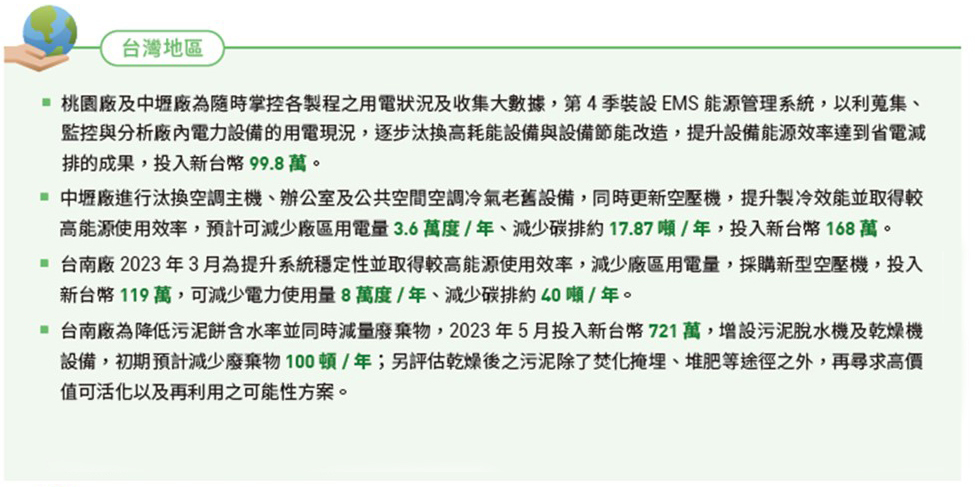Environmental Protection
Actively promote energy conservation and carbon reduction, waste management and resource recycling, and continuously reduce the impact of corporate operations on the environment.
Environmental Protection
Energy use mainly comes from purchased electricity, natural gas and coal. To strengthen the management of energy use, we have organized an energy-saving leadership group to promote energy-saving measures to reduce consumption, reduce losses and curb waste. We also formulate energy-saving indicators and goals by cooperating with the energy and environmental protection policies of local governments or signing the "Annual Agreement Energy-Saving Target Responsibility Letter", making improvements in energy conservation and improving energy conversion efficiency to reduce the impact and influence on the environment.
Energy Management
Energy use mainly comes from purchased electricity, natural gas and coal. To strengthen the management of energy use, we have organized an energy-saving leadership group to promote energy-saving measures to reduce consumption, reduce losses and curb waste. We also formulate energy-saving indicators and goals by cooperating with the energy and environmental protection policies of local governments or signing the "Annual Agreement Energy-Saving Target Responsibility Letter", making improvements in energy conservation and improving energy conversion efficiency to reduce the impact and influence on the environment.
Each region continues to implement various energy management and measures in the hope of achieving energy conservation and emission reduction through relevant actions.

Greenhouse gas management
Knowing that the main source of greenhouse gas emissions is energy consumption, the current implementation direction is energy inventory, and each factory can manage itself according to local regulations.

Water management
In recent years, global rainfall patterns have changed, the frequency of heavy rains and prolonged droughts has increased, and unstable water supply has increased business operating risks. As a company with food processing as its main production model, the importance of clean and hygienic water resources and stable water supply to the group is self-evident. Therefore, water resource management plays a key role in the group's sustainable operation process.
Due to changes in rainfall patterns in recent years, there have been occasional water outages or water restrictions, with an average outage time of less than 24 hours. To cope with related situations, the Zhongli Plant in Taiwan has a reservoir and water tower with a water storage capacity that can be used by the plant for 3 days or more to ensure uninterrupted operations.
Due to the large differences in seasonal and regional rainfall in different regions, it is possible that drought factors may lead to policy restrictions on water use or reduced water supply. In addition to continuing to implement various water-saving measures and wastewater treatment methods, each region also conducts an inventory of water use, using the World Resources Institute (WRI)'s water risk map tool to regularly assess the water risk indicator level of each production site, and formulates water use improvement plans and water conservation plans based on the inventory results.
Waste Management
In response to the global trend of green environmental protection, the concept of circular economy is introduced into waste management. Use process changes to reduce waste generation, and use combination to increase process recycling rate to achieve the goal of reducing waste from the source.
Each region clears, treats or reuses waste in accordance with local government laws and regulations, and regularly completes reports via the Internet. It also searches and confirms the clearing, treatment and reuse of industrial waste online within the prescribed period, and implements waste classification, collection, storage, management and transportation to effectively control waste. The Group's waste treatment in each region complies with regulatory requirements, applies for discharge or treatment permits in accordance with the law, and reports truthfully to the competent authorities. Currently, waste is mainly disposed of by outsourcing clearing and treatment.
The Taoyuan factory counts the amount of factory waste generated on a monthly basis to determine which factory activities generate the most waste and which types of waste have the greatest impact on the environment and health. The plant also evaluates waste management optimization plans in quarterly occupational safety committees. The policy of recycling used cooking oil is currently being implemented to reduce waste generated during the production process.
Stakeholder Communication
Keep close contact with stakeholders to understand your needs and expectations
And integrate it into corporate decision-making to jointly achieve sustainable long-term goals.
Sustainability Report
We publish a sustainability report every year to fully present our environmental performance
Efforts and achievements in social and corporate governance (ESG).
Need help?
Welcome to contact us, or quickly check the sales outlet closest to you to enjoy the freshest and most delicious food experience!
